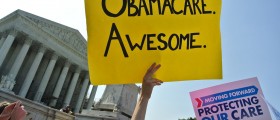
The pre-existing condition scam
Have business to make money. A sad but true motto that all companies aspire to. This is also true for health insurance companies. Their job is to take your money, not to give you theirs unless they have no other option. Health insurance is almost like a wager and if health insurance looses such bet with you, it will owe you money. To avoid this, health insurance companies therefore impose some rules. In example, health related problems that many Americans suffer from are defined as pre-existing conditions.
People that suffer from such "pre-existing conditions" are then either denied health insurance, charged with higher premium rates, or various additional expenses that can be interpreted as pure rip-off. And when it comes to insurance payoff, people with pre-existing conditions are imposed a waiting period before the beginning of coverage.
Among others, conditions such as heart disease, cancer, high blood pressure, type 2 diabetes and asthma, conditions that affect a significant percent of American population, are regarded as pre-existing conditions. Even minor conditions such as previous accidental injury or hay fever may deny you coverage.
As of September 2010, children under 19 years of age must be allowed access to their parents' health plan and insurance companies will not be insuring children, but such coverage will exclude treatments for any pre-existing condition. The same will apply to people over the age of 19 as of 2014.
Pre-existing condition exclusion
Some health insurance companies will accept your health plan, but will deny you coverage for care or services that are related to any pre-existing condition for a certain period. This is known as conditional acceptance. This exclusion period ranges from six to eighteen months, and does affect any conditions other than pre-existing conditions.
Health plans offered by employers can also have exclusion periods. However, maximum duration of exclusion period is limited to twelve months (or eighteen, if you enrolled late) and applies only to conditions that required treatment in the previous six months.
HIPAA act of 1996 provides a degree of protection in cases of buying, continuing or changing health insurance plan. In example, act limits the use of pre-existing condition exclusions, prevents many forms of discrimination such as denial of coverage or overcharging, and usually allows for purchase of health insurance plan even for the unemployed. It also introduced a "creditable coverage", meaning that if you had health coverage for at least one year before enrolling for a new coverage plan (in example, when switching jobs), and less than 63 days passed between termination of old insurance and enrolment in a new plan, this new plan is not allowed to apply any pre-existing condition exclusion.

















Your thoughts on this
Loading...